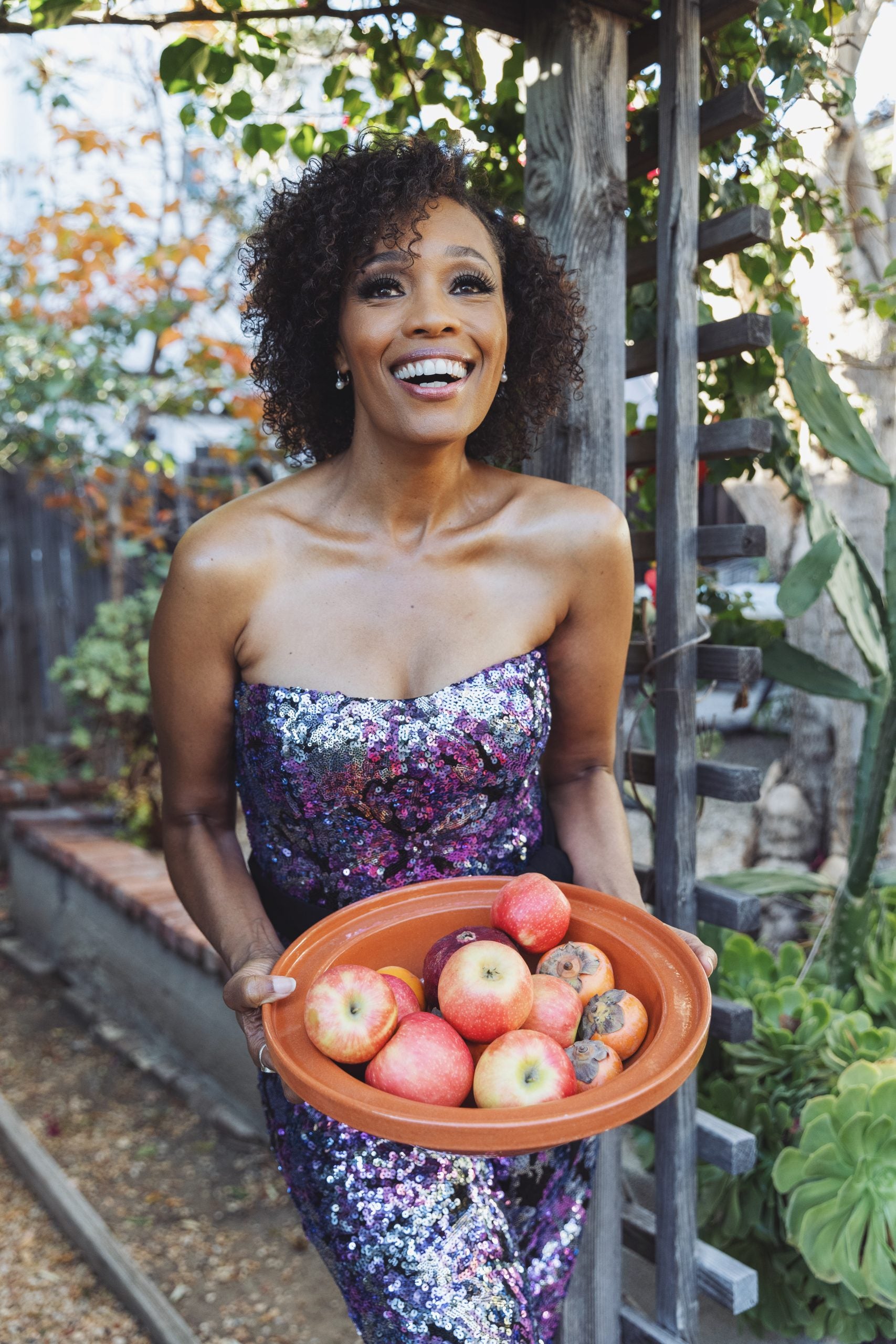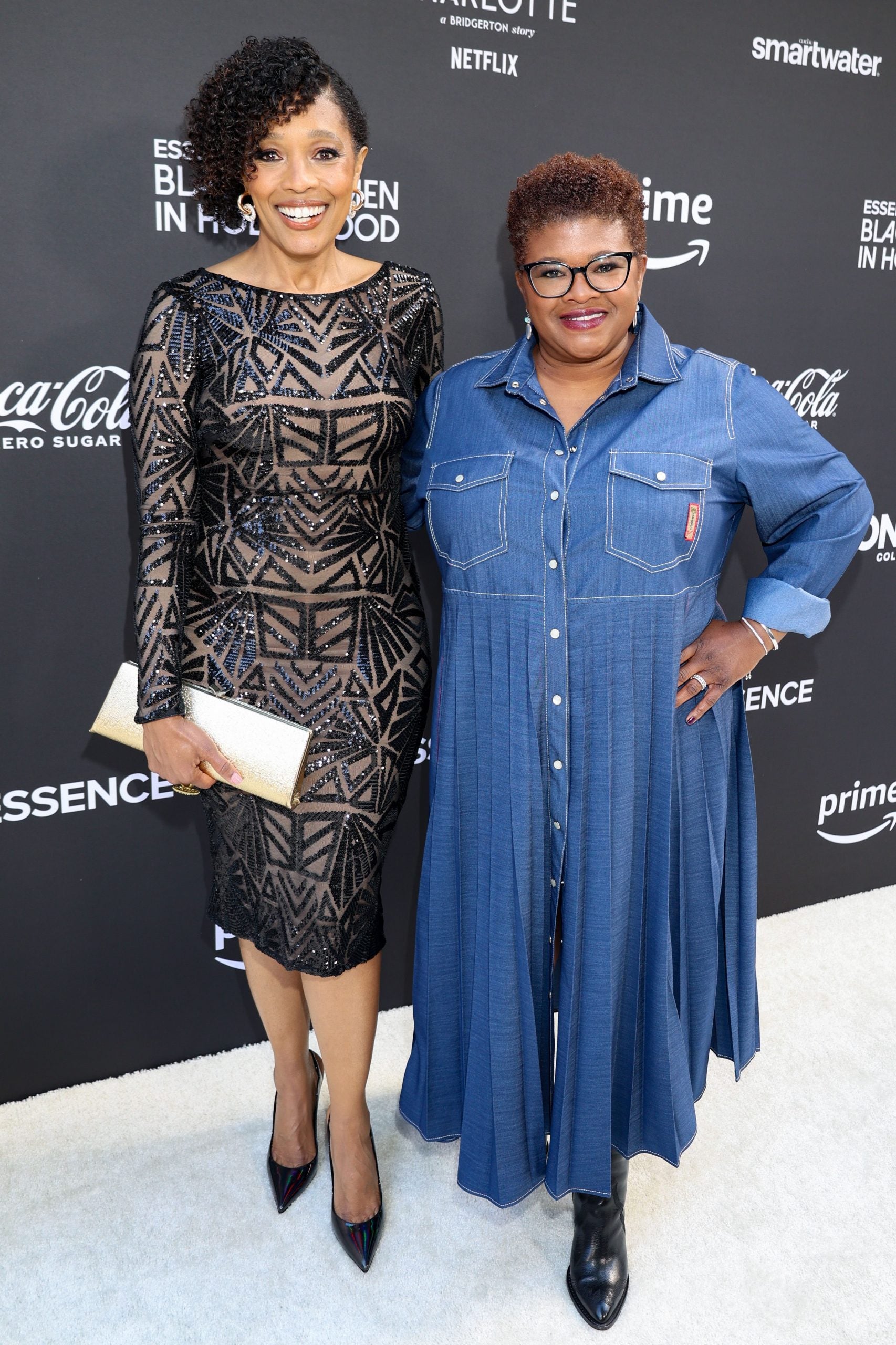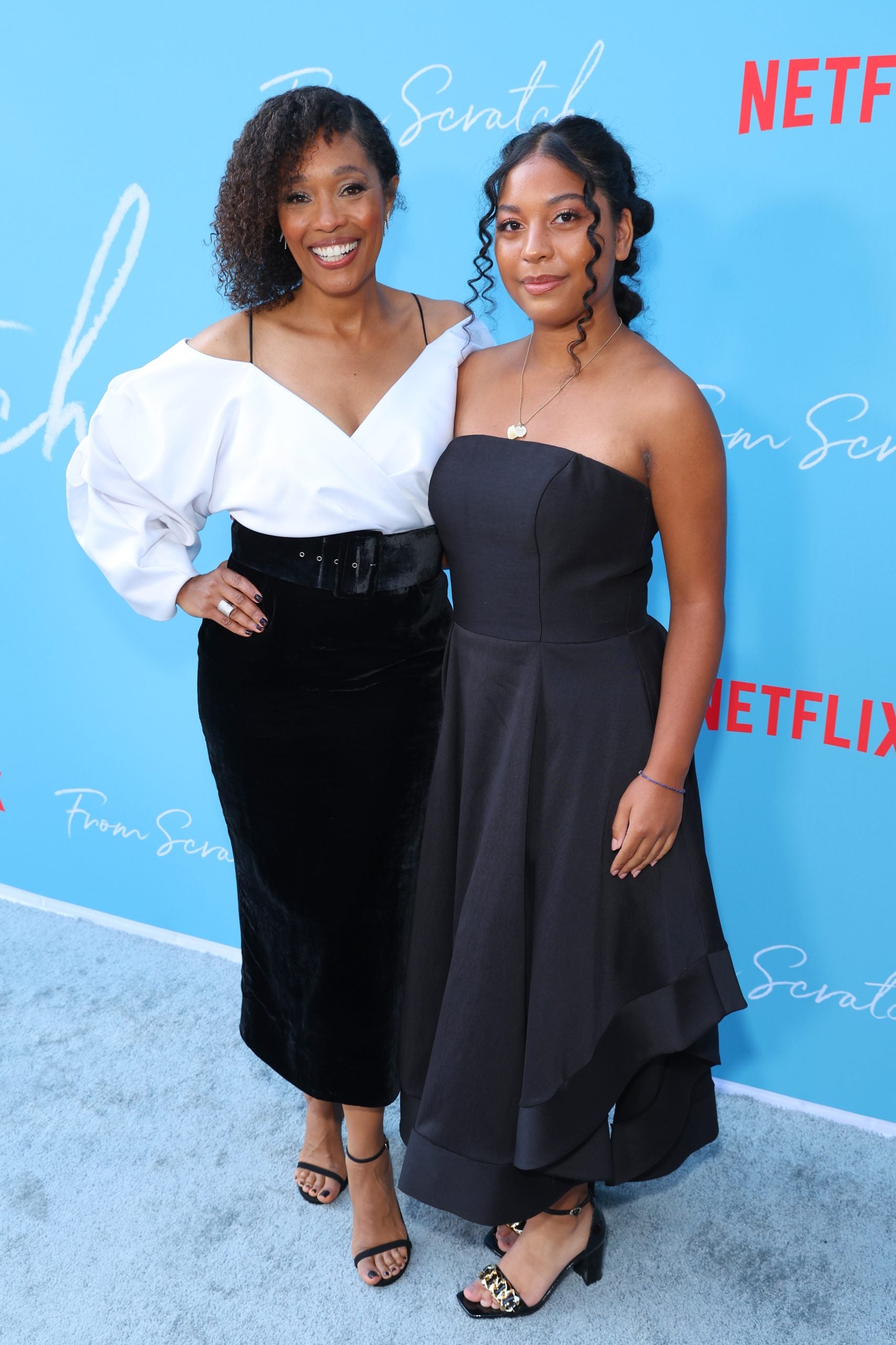
[ad_1]
Tembi Locke loves being a woman who wears many hats. In addition to being an actress, she’s an author, the writer of the best-selling memoir, From Scratch, which was turned into a hit Netflix miniseries starring Zoe Saldana, that she co-executive produced. She’s also a podcaster, wrapping up the second season of her program, Lifted, which centers “female creators, writers, entrepreneurs, artists and thought leaders.” To be able to do all of this, and excel at it, is a feat not lost on Locke.
“I think I grew up thinking, ‘Oh, there’s this one way to sort of be an artist,’” she tells ESSENCE. “And what I know now is there are many ways to be an artist, and that’s just amazing.”
She has balanced all of this with motherhood, caring for her daughter Zoela (adopted as a newborn) on her own after the death of her first husband, Saro, in 2012. At that time, Zoela was seven. Now she is 19, in college, and Locke is in the next chapter of mothering.
“It’s another evolution of our relationship,” she shares. “I am trusting in the work I did as a mother and the love I’ve seeded in her and the strength and the grace.”
She’s also in a new chapter of life, getting to focus on her own needs and desires as a burgeoning empty nester. It’s been eye opening. “I think in some ways, Lifted is an outgrowth of that,” she says of getting to pour into her podcast. “I’m realizing, ‘Oh, there’s new space in my life.’”
So what does one do with this space when being a parent has been the focus, the main joy, for so long? We spoke with Locke about this new season and elevating the work of other women within it, what parenting looked while journeying through grief, and how she parents, and provides support, now that her daughter is a young adult finding her way. These are the insightful things she had to share.
ESSENCE: Congratulations on the second season of Lifted. What was the inspiration behind creating this podcast?
Tembi Locke: Well, first of all, I love creative, strong, inspiring women and I like a long-form conversation. I think I’m also at a point in my life where I’m really looking to a full range and spectrum of women who are doing dynamic things. And I’m curious, I’m very curious about the how and about what motivates them and what their unfolding looks like because I think we can all learn from it.
So it began really from my own curiosity, and quite frankly, my own kind of just selfish reasons. I want to know what is happening, how do people do this? And I think because I’m also at the cusp of a change in my life, and my life is expanding and growing and changing as all of our lives are, I thought, “Well, I think the best way to learn is to listen.”
I know that you are a cook and a homesteader. Was that part of the reason why you wanted to center women in food in the culinary industry for this second season?
It is in part that because I love food. I think midway through recording the season I realized I was really pulling at the threads of the themes of From Scratch, my book and the series based on the book.
Then I realized, “Oh, this is also a way to connect to my late husband,” because he was a chef and so much of his life creatively and professionally centered around an expression of creativity through food. So that was sort of an unexpected awareness that I had. But I really, I like food. Food was a big theme in From Scratch.
I know a lot of my listeners know me and love the book and love the series, and so it’s an extension of that conversation, but a byproduct of it with this other sort of a-ha moment.

Would you mind if I ask why it’s still so important to you to honor your late husband, your first husband, in that way?
Yeah. In some ways, we lose someone who is so pivotal and meaningful and so much a part of the fabric of our lives, I think consciously or unconsciously, we’re always looking for ways to have their energy and their life force and their love be ever present.
So it’s an honoring of him, and it’s like, “Oh, if he were alive, he would be asking these questions. He’d want to know about this. We’d be having these conversations.” So I think a part of the fabric of grief and the long arc of grief is about finding new and constant ways to be connected to your beloved.
That’s really deep. And obviously the first way that he was honored was through your amazing memoir. Obviously the impact has been crazy, and it got to be developed into the popular Netflix series. How did you take how it was received?
Thank you for asking that question. It’s been beautiful, awe inspiring, humbling. I’m incredibly grateful for it. I think over time, I’m beginning to see that the series itself is its own kind of medicine in the world. It’s medicine of joy and love and rebirth and resilience, and it’s doing its work. So when I hear people talk about how they connect with the story on so many different levels, it’s just incredible.
I just think this is a testament to the power of love. Not just the love I had with my late husband, but I mean all the iterations of love. I think the fact that the series connects so deeply and so broadly is because at the epicenter of it is a commitment to love; whether it be art or whether it be food, or whether it be a child, or whether it be a sister or a lover.
Also, I know all of us who made it, the story, sure, it starts with me and it is centered in my story, but it’s so much bigger than me and that’s because everybody poured their love into making the show.

I love that. And speaking of love, you and your late husband, you share your daughter Zoela, who is 19. So what has it been like now to be, I mean, you’re not an official empty nester, because she’s going to come back home, but what is it like to be at that beginning stage?
It’s a big act of trust at this stage of mothering, which it is for all mothers, but this is a really big stage of trust. I hope that I am a person who can be the soft landing spot. I can be a counselor, but she’s on her own path.
What that is also is an invitation for me to look at whole parts of myself that perhaps I had to put on the back burner. So it’s also an invitation to really reconnect to parts of myself and explore new things outside of motherhood.
Can you talk to what the motherhood journey for you was like after losing your partner?
In some ways there’s a distinction when grief is a part of the landscape between being a single parent and being a solo parent. Meaning, I didn’t have shared custody that she could go to on the weekend. And so being a solo parent means that you are holding all aspects of this person’s life without a partner in the picture. On top of it, you have a young child who is grieving deeply for the loss of that parent, and you yourself are grieving. It was like being on the rocks at low tide with the sun beaming down on you. It was just really hard.
But also the grace in it was the community who stepped forward to help. It was the fact that she and I became incredibly close. A part of being a parent in the landscape of grief and the thing I always say is you have to be completely honest with your child at all times because they are looking there. You are the one person that they have left, and they need to have a sense of trust with you.
So I knew I had to be honest with her about what was happening or how I was feeling. I think that that created a relationship that is very unique. So people who are parenting through grief are walking a different path. It’s not easy, but there’s a beauty in it that I can see from this vantage point that I couldn’t always see day to day.
What is it like to parent with a young adult now? Knowing everything what was required, doing it by yourself. Now that she’s in the world and you have to trust in her decision making and in what you instilled in her, what is it like to parent at this point, and what does it require from you?
Well, here’s the thing, it is definitely some of like, “Hey, check in. How are you doing?” But it is also holding space for the ways in which I know certain parts, certain things, especially in young adulthood, are going to land differently for a child who has a background of grief, of loss of a parent.
Also, a part of this stage of parenting is trusting, it’s the trust and the work that you’ve done and waiting for her to come to me and trusting that she will, and that if I don’t have all the answers, I can still just be a point of presence.

You’ve also found love again, and you got married again in 2020. How has that been?
It happened for me when I wasn’t looking for it, but I was open to it. And it has taught me that there are always these second chances, second chapters and constant unfolding. And I’ll tell you, every day I wake up, and I am grateful for an opportunity to explore love again. We all know love is not always easy, but it’s an honor to be able to love someone else and to receive the love of someone else. And I know that I learned that in beautiful and in hard ways, and so I don’t take it lightly. And so it’s a beautiful unfolding, and it is joyous. And the other thing about meeting a partner at a stage in life where you’re already a parent and you’re older and you’ve had a previous relationship before is you are really clear about what really matters, and so it’s beautiful. It is joyous, and I am very, very happy and honored by that.
And if you don’t mind me asking, I also wondered for those who might also wonder, how does Robert handle everything regarding how you honor your late husband?
Yeah, no, Robert, we talk openly about Saro at home. He comes with me to the cemetery. He very much knows that in partnering with him, it doesn’t mean that we check our whole past at the door. And if you’re loving us, you’re loving all of us. Just like I don’t ask him to check his past at the door.
As a mom in this stage of your experience raising a young person, what do you like to do for yourself now, now that you have a lot more time to pour into you?
Oh, my goodness. I take walks. I get massages. I allow myself a little more rest in the morning and then the evenings. I’m big on sleep. I have more time to read. I really am really trying to take care of myself in new ways, so the care that I pour outward toward her, I know I’m like, “Oh, what if I gave that same energy to me? What would that feel and look like?” And it’s beautiful.
And lastly, I wanted to ask you, how has it been to start as an actress, but to get to branch out in this way and get to pursue the passion of writing and podcasting?
My dream was to be an actress truly growing up, but what has happened over the years is I’ve had this beautiful career as an actor, and I love it. And then, as my career has evolved and I also have become an author and then a screenwriter and a producer, and now a podcaster, I realize a common thread is storytelling. And so in a way, what seems like all these different things are really the same thing expressed differently and through different art forms. But I love it, and I feel so grateful every day that I get to wake up and sort of practice art and creativity in these ways. And it’s just very, very exciting.
[ad_2]
Source link







